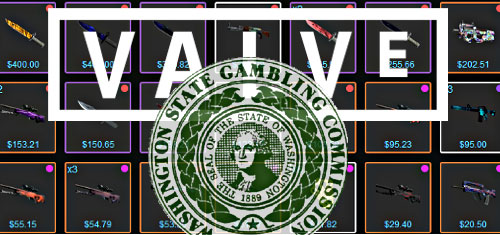 Gambling regulators in Washington state have ordered eSports game developer Valve Corporation to clamp down on ‘skin’ betting or face the consequences.
Gambling regulators in Washington state have ordered eSports game developer Valve Corporation to clamp down on ‘skin’ betting or face the consequences.
On Wednesday, the Washington State Gambling Commission issued a statement saying it had warned Valve to “immediately stop allowing the transfer of virtual weapons known as ‘skins’ for gambling activities through the company’s Steam Platform.”
Skins are purely cosmetic add-ons to eSports weapons that can be purchased with virtual currency or won via achieving certain game benchmarks. While they in no way affect game play, certain skins can be highly prized among game fans, and a lucrative side business of reselling skins via the Steam marketplace has developed.
Some third-party sites allow players to wager skins on the outcome of eSports matches, while other sites offer the ability to wager skins on purely random games of chance.
The Commission says it contacted the Bellvue-based Valve in February to voice its concerns about gambling activities surrounding Valve’s Counter Strike; Global Offensive (CS:GO) game. At the time, the Commission said it was trying to determine if further regulatory action was necessary.
Commissioner Chris Stearns now says the Commission has determined that eSports skin betting “remains a large, unregulated black market for gambling.” The Commission says it expects Valve to do whatever it takes to stop third-party sites from using Steam for gambling purposes, including via ‘bots’ that automate betting transactions.
The Commission has given Valve until Oct. 14 to demonstrate its full compliance with state gambling laws or risk the Commission taking additional civil or criminal action against the company. The penalties lurking in the Commission’s arsenal include seizure and forfeiture of any property related to illegal gambling, forfeiture of Valve’s corporate charter and possible criminal charges against individual Valve employees.
Washington state is renowned for its harsh treatment of online gambling, having made the mere playing of online poker a Class C felony back in 2010 and more recently attempted to label daily fantasy sports with the same felonious brush.
In July, Valve banned third-party sites from using the Steam marketplace to facilitate skin betting, and issued cease & desist letters to a number of skin betting sites. A number of these sites, including CS:GO Lounge, later shut down their skin betting operations.
Valve was prompted to act after being hit by a class action lawsuit by eSports players who accused Valve of complicity in the explosive growth of the skin betting industry. Ironically, the Commission’s statement was issued the same day a federal court dismissed the class action suit against Valve because “gambling losses are not sufficient injury to business or property for RICO [racketeering] standing.” The class action attorneys reportedly plan to refile their suit in state court.
A recent report by Narus Advisors claimed that CS:GO Lounge processed over 103m skins over the first seven months of 2016, generating a total skin betting handle worth around $1b. CS:GO Lounge has attempted to reinvent itself as a legit eSports betting operator that doesn’t take action from the US or other countries where such activity is prohibited.
Other skin betting sites have attempted to dodge Valve’s C&D order through the use of intermediaries that handle the conversion from skins to virtual currency for betting purposes.